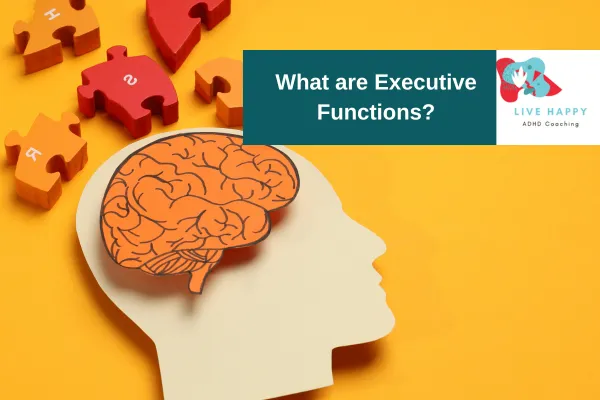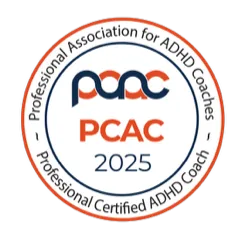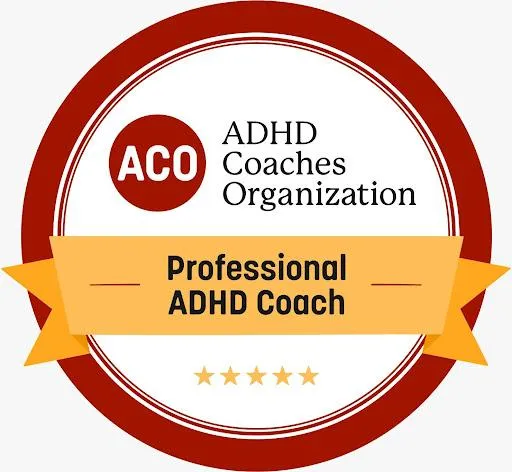Live Happy ADHD Coaching
Welcome.
Are you ready for a change but keep hitting roadblocks?
I can help you move from survival mode to thriving and reconnecting to the joy of life. I help my clients stay on track, create calm, and bring out the best in themselves. I invite you to learn how to enhance the way your unique ADHD brain works, instead of working against it.
Meet your Coach

I used to struggle with exactly the same thing.
Dorsey McFadden currently lives in Richmond with her husband and pets. She earned a double BA degree from the University of North Carolina at Chapel Hill in Political Science & Communications and International Security Studies & Rhetoric.
In her previous life, Dorsey worked in digital marketing for over 20 years. Now she’s building a career as an ADHD coach, educator, and advocate.
She also cofounded FlexYourADHD.com as a platform with a significant community of adults eager to learn about their ADHD.
As the founder and coach of Live Happy ADHD Coaching, Dorsey is passionate about coaching adults living with ADHD and parents of children with ADHD to help them live happy and healthy lives.
Together, she works with her clients to develop techniques and approaches to better understand how to support themselves and their children.
Dorsey aims to empower those with ADHD to work with their unique brain, not against it.

Meet your Coach
I used to struggle with exactly the same thing.
Dorsey McFadden is a certified ADHD coach, educator, and advocate through training from the ADD Coach Academy (ADDCA), holding credentials from both ADDCA and the Professional Association of ADHD Coaches (PAAC). Based in Richmond, she lives with her husband and pets. With over 20 years of experience in digital marketing, she brings a wealth of strategic insight to her coaching practice. Dorsey holds a double BA from the University of North Carolina at Chapel Hill in Political Science & Communications and International Security Studies & Rhetoric.
As the founder of Live Happy ADHD Coaching and FlexYourADHD.com, Dorsey is passionate about helping adults with ADHD and parents of children with ADHD build happier, more fulfilling lives. She partners with her clients to create personalized strategies that harness the strengths of the ADHD brain, focusing on empowerment, self-understanding, and practical support systems.
Dorsey's mission is simple: to help people stop fighting against their ADHD and start thriving with it.
While there's no magic solution in life, the supportive, practical, concrete, and collaborative process of coaching can help to bridge the gap between where you are right now and where you want to be.
Do any of these sound familiar?

difficulty with planning and prioritizing
feeling unfulfilled and unsuccessful
impaired communication or social skills
trouble getting started/lack of initiative
difficulty maintaining focus
poor self-care (exercising, getting to bed, etc.)
difficulty explaining their ADHD to others
getting easily distracted and overwhelmed
challenges with working memory
poor time and energy management
lack of organizational skills
trouble harnessing motivation and interest
impulsivity/lack of inhibition
procrastination (sometimes extreme and high stakes)
poor communication skills
difficulty with planning and prioritizing
feeling unfulfilled and unsuccessful
impaired communication or social skills
trouble getting started/lack of initiative
difficulty maintaining focus
poor self-care (exercising, getting to bed, etc.)
difficulty explaining their ADHD to others
getting easily distracted and overwhelmed
challenges with working memory
poor time and energy management
lack of organizational skills
trouble harnessing motivation and interest
impulsivity/lack of inhibition
procrastination (sometimes extreme and high stakes)
poor communication skills

Testimonials
What Does Success Look Like?

That depends on the client.
For some it will look like completion of a project while, for others, it may be development of self compassion and self
awareness which enriches all areas of their life.
What Is Coaching?


Coaching is the facilitation of growth and change. A coaching partnership helps close the gap between who you are, what's important to you, and what you're doing. so that you can lead a more satisfying and effective life. Coaches support our client's understanding of their ADHD brain and its related challenges. As well as how it impacts your personal and professional life so that you can utilize practical, realistic strategies to shift from chaos to calm.
What Does Success Look Like?
That depends on the client.
For some it will look like completion of a project while, for others, it may be development of self compassion and self
awareness which enriches all areas of their life.


What Is Coaching?
Coaching is the facilitation of growth and change. A coaching partnership helps close the gap between who you are, what's important to you, and what you're doing. so that you can lead a more satisfying and effective life. Coaches support our client's understanding of their ADHD brain and its related challenges. As well as how it impacts your personal and professional life so that you can utilize practical, realistic strategies to shift from chaos to calm.
More Topics to explore
Something for every reader

What are Executive Functions?
According to science executive functions are the specific self-directed actions that we use to control ourselves. They are the mental abilities that we use to guide our behavior, consider our past and anticipate the future.
ADHD impacts the development of the prefrontal cortex of the brain, which then impacts the normal development of 5 executive functioning areas thus giving us a myriad of symptoms.
Inhibition
Nonverbal working memory
Verbal working memory
Emotional regulation
Planning/Problem solving
Here’s where the inconsistency of ADHD rears its ugly head again. Your individual brain development will determine the extent to which you are impaired in these areas.
According to Dr. Russell A. Barkley, Ph.D., an internationally recognized authority on attention deficit hyperactivity disorder (ADHD or ADD) in children and adults, “Executive functions operate together but can cause impairment separately” with each area developing independently but in sequence so that they each build on each other. Altogether, these areas of development combine into a “mental structure that facilitates self-control”.
The deficits we suffer impair this natural progression that should “ultimately add up to adult self-determination”.
Understand that you can compensate for the underdeveloped executive function by improving practical skills.
For example, I know I have the capacity to be awful at planning. I’ve seen it in my own behavior. But due to these failures, and the intervention of a tutor at a young age, I learned to meticulously plan for the things I want to be successful at. I don’t think anyone would accuse me of being a bad planner, but that’s only because I overwork to prepare. They don’t see the stress and anxiety these events cause me. They see the beautiful end result.
So let’s talk about those executive functions!
Some of these areas can get confusing, so if you really want to get clear, I strongly recommend the book “Taking Charge of Adult ADHD” target=”_blank” rel=”noreferrer noopener”>Taking Charge of Adult ADHD” by Dr. Russel Barkley.
Nonverbal working memory
This function allows you to hold mental pictures in your head, along with sounds, tastes, sensations and smells. Additionally it allows us to visualize ourselves in the future or to study our past behavior.
Being impaired in this area means you’ll have difficulty with:
Visualizing long-term goals, thus acquiring long-term rewards
Understanding or learning long, complicated sequences of behavior
Visualizing past behavior or events in order to predict future behavior or events
Learn through imitation (vicarious learning)
Development of self-awareness – Awareness of how your behavior or actions impact others
Awareness of and management of time
“To others you might look like you don’t think before you act. It would be more accurate to say that you have trouble remembering before you act”
“Taking Charge of Adult ADHD” by Dr. Russel Barkley.
Verbal working memory
Do you talk to yourself? Of course you do – that’s natural and something all kids do outwardly until between the ages of 7 and 9. At that age neurotypical children typically internalize this self talk.
Verbal working memory allows you to verbally contemplate in your mind’s eye. It allows us to solve problems, to formulate rules and plans. To operate in a society built on rules and laws. This is the function that allows you to silently hold words you read to yourself in your mind for future reference.
This is the executive function that allows you to self question and self talk in order to weigh pros and cons based on past experience to formulate plans to improve the future. To conduct moral reasoning and to be forward thinking.
A person with ADHD will have difficulty with:
Self talk used to self control
Self talk to problem solve
Planning around uncertainty
Setting standards for yourself
Visualizing plans
Rule following or breaking
Flexibility
Morally questionable behavior
Understanding contextual sensory information
Self-regulation of emotion
I doubt there’s a single person reading this that hasn’t at one time or another wondered why they overreacted to something small. Nonverbal and verbal working memory are instrumental in helping us to regulate our emotional response. We use self talk to see how we feel and what we should do about it.
Humans use self regulation of emotions to control arousal – the self directed urge and energy to act.
This is the executive function that motivates us when there are no external rewards. It’s also at play when we express emotions in a socially acceptable way.
A person with ADHD will have difficulty with:
Appropriate emotional reactions (Particularly evident for women during certain phases of the menstrual cycle)
Exaggerated emotions that steer you wrong’
Rousing yourself to do something you don’t want to but need to
The mind’s playground: planning and problem solving
The manipulation of those images and words we hold in our mind allows us to play with them thus planning and problem solving. It’s no wonder this Executive Functioning area is hindered if the others above are. This ability allows us to consider all options and decide on the best actions to reach a goal. This is the executive function at play when thinking outside of the box.
If you have trouble with this area you’ll have more difficulty with:
Quick thinking or thinking on your feet
Organization
Order of importance
Steps to achieving goals
Outside of the box problem solving is actually a skill I’m quite strong with, even with ADHD – because again remember ADHD is inconsistent.
There you have it. These are the four executive functioning areas that, according to Dr. Russell A Barkley’s book “Taking Charge of Adult ADHD” are slow to develop or impaired in people with ADHD.
Here’s a great article from ADDitude Magazine if you want to learn more about Executive Functioning.
How Does Coaching Work And How Does It Help You?
Coaching sessions create space away from day to day demands for a dialogue between the coach and client. The client determines the long-term direction of coaching and is responsible for bringing a topic/issue/question to each session. Together, the coach and client explore who the client is, who they think they are, and who they want to be in order to clarify desired outcomes and actions to further the client’s agenda.
As a coach, I will ensure we make the most of your time. My role is to be your sounding board, mirror, and champion your efforts. I will provide models and structure to help you organize your thoughts, beliefs, and values. I will help you to bring details into focus to reach a deeper understanding and appreciation of yourself. I will hold you accountable for your decisions and actions and challenge you to be compassionate with yourself while setting realistic and achievable goals.
However, I will never tell you what to do. Coaching sessions offer an opportunity for you to learn something new about yourself, a different way of thinking about a situation, or uncover a belief that was limiting the options you thought were available to you. The “work” to apply this learning toward changing your life continues beyond the coaching session.
Welcoming clients of all races, cultures, identities and orientation
Disclaimer: Coaching is not to be used as a substitute for professional advice by legal, medical, financial, business, spiritual or other qualified professionals. We encourage our clients to seek independent professional guidance for legal, medical, financial, business, spiritual, or other matters. With Coaching, all decisions in these areas are exclusively the responsibility of the client who acknowledges that decisions and actions as a result of coaching are their sole responsibility.
Example Topics for Coaching
ADHD Life skills & Executive Functioning
Relationship Skills
Friendship and Support System
Parenting Children with ADHD
Organizing Skills
Addiction Dangers
Emotional Regulation
Mindset Improvement
Work/Life Balance
Communication Skills
Self Awareness
Self Compassion & Mindfulness
Study Skills
Self Care Skills
Time Management
Task Management
Advocating Skills
Routines and Systems
Healthy Boundaries
Managing your life
Planning & prioritizing
Putting plans into action, task initiation
Goal-directed persistence
Taking actions that align with your physical & emotional needs
Learning new strategies to manage executive functioning
Navigating neurodivergent relationships
Self-regulation & interoceptive-awareness
Emotional impulsivity
Communication strategies
Physical health and wellness
ADHD Coaching & Consulting by Dorsey McFadden
Located in Richmond, VA
Accepting clients Worldwide






Facebook
Instagram
LinkedIn